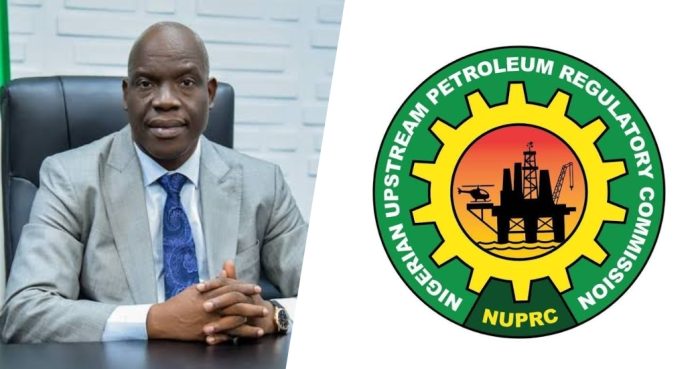The Nigerian Upstream Petroleum Regulatory Commission (NUPRC), at the weekend, disclosed that it had established an Energy Transition and Carbon Monetisation unit in line with the federal government’s 2060 net-zero aspiration for carbon emissions.
This is just as the Nigerian Content Development and Monitoring Board (NCDMB) has disclosed that oil and gas opportunities valued at over $50 billion in projects would be developed within the next five years in the country.
NUPRC has also unveiled plans to organise roadshows for the awardees of Petroleum Prospecting Licences (PPL) and the bidders for the Nigerian Gas Flare Commercialisation Programme (NGFCP) to explore funding opportunities and leverage capabilities of industry players, and prospective investors to de-risk the assets.
Speaking during the just-concluded Nigeria Oil and Gas Opportunity Fair (NOGOF) 2023 in Yenagoa, Bayelsa State, the Chief Executive of NUPRC, Mr. Gbenga Komolafe, explained that the new department will drive the focused implementation of a robust regulatory framework for decarbonisation of upstream operations.
In addition, Komolafe, who was represented by the Executive Commissioner, of Economic Regulation and Strategic Planning, Dr Kelechi Ofoegbu, noted that the initiative would ensure the introduction of clean mechanisms in field development, mitigate the impact of energy transition and ensure sustained investments in upstream operations while improving the environmental credentials of oil and gas.
The NUPRC chief executive noted that the Petroleum Industry Act (PIA) as enacted in 2021, had enhanced the business landscape in Nigeria’s petroleum industry, as it has provided a more transparent, efficient, and investment-friendly regulatory framework for the industry.
This renewed disposition, he said, reflects the nation’s readiness to attract local and international investors in the oil and gas space.
Komolafe further stated that in line with the provisions of the PIA, the commission has developed priority regulations to reinforce the meaning of the intent of the Act, by creating a predictable regulatory environment for would-be investors.
“So far, five priority regulations have been gazetted, while 13 others have been submitted to the Ministry of Justice for review and eight are at various stages of development,” he added.
According to him, Nigeria’s role as a major player in the global oil and gas industry is not in doubt, as it is currently the highest oil producer in Africa and the second highest in terms of proven oil reserves with huge growth potential.
As of January 1, 2023, Komolafe recalled that Nigeria had 36.966 billion barrels of crude oil and condensate reserves and 208.83 trillion cubic feet of natural gas reserves.
He stated that despite the global clamour for decarbonisation and energy transition, oil and gas would remain relevant in the global energy mix, to guarantee energy security for Nigeria’s teaming population.
Komolafe pointed out that to deliver on her commitments towards the reduction of carbon footprints, Nigeria has adopted gas as a transition fuel and expects to significantly increase gas consumption during “the Decade of Gas” declared by President Muhammadu Buhari. This adoption of natural gas as a transition fuel, he stressed, is a boost for Nigeria, which has over 208 trillion cubic feet (TCF) of gas reserves that can be harnessed to help the country’s transition to Net Zero by 2060, while driving economic growth and development, to simultaneously tackle energy poverty and also meet the climate ambition.
Accordingly, the commission, Komolafe posited, has intensified efforts to grow gas reserves, boost production and eliminate routine gas flares in all upstream operations across the value chain, while also dealing with methane capture and other fugitive gas emissions.
“The significance of this is that more gas would be available for domestic utilisation as Liquefied Petroleum Gas (LPG), feedstock for power generation plants, fertiliser plants, and petrochemicals to mention but a few.
“Each of these areas shows that gas would truly be the catalyst and fuel for industrialisation as well as provide unique entry points for willing investors and opportunities to build capacity locally,” he said.
The NUPRC chief executive explained that the commission as the upstream petroleum industry regulator had embarked on the development of a regulatory framework for carbon-pricing systems, to make businesses pay for their emissions and incentivise emission reductions through carbon credits.
“Accordingly, a new department called ‘Energy Transition and Carbon Monetisation’ has been created in the commission to coordinate the drive towards energy transition in the Nigeria oil and gas sector.
“The new department will drive the focussed implementation of a robust regulatory framework for decarbonisation of upstream operations, introduce clean mechanisms in field development, mitigate the impact of the energy transition, and ensure sustained investments in upstream operations whilst improving the environmental credentials of oil and gas,” he stated.
Komolafe said he hoped that in months to come, Nigeria should be able to share the vital lessons from the Nigerian transition success story with the global community.
He posited that the commission since its inception had concluded and commenced various initiatives and programmes to create investment opportunities and enhance the development of the upstream oil and gas industry in Nigeria.
Notable among these, according to Komolafe, were the completion of the 2020 marginal field bid round and award of Petroleum Prospecting licences (PPL) as well as the initiation of the ongoing 2022/2023 mini bid round for deep offshore assets.
He noted that the NUPRC had also re-commenced the Nigerian Gas Flare Commercialisation Programme, which is also ongoing.
“Though these programmes have been initiated and are ongoing, opportunities still exist for investors as NUPRC continues to implement strategic actions and initiatives aimed at increasing national crude oil and gas reserves and production.
“In this regard, the commission will in the weeks ahead organise its Maiden Nigerian Upstream International Investment and Financial Roadshow (NUIIFR) for PPL Awardees, NGFCP bidders, and potential investors in the upcoming mini bid for deep water assets, to explore funding opportunities and leverage capabilities of industry players, prospective investors (local and offshore) to de-risk the assets and awards.
“The event will provide an opportunity for participants to network, exchange ideas, and chart strategic pathways to enhance investment opportunities,” he added.














